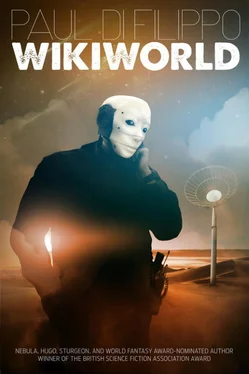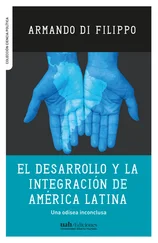Paul Di Filippo - WikiWorld
Здесь есть возможность читать онлайн «Paul Di Filippo - WikiWorld» весь текст электронной книги совершенно бесплатно (целиком полную версию без сокращений). В некоторых случаях можно слушать аудио, скачать через торрент в формате fb2 и присутствует краткое содержание. Город: Toronto, Год выпуска: 2013, ISBN: 2013, Издательство: ChiZine Publications, Жанр: Фантастика и фэнтези, на английском языке. Описание произведения, (предисловие) а так же отзывы посетителей доступны на портале библиотеки ЛибКат.
- Название:WikiWorld
- Автор:
- Издательство:ChiZine Publications
- Жанр:
- Год:2013
- Город:Toronto
- ISBN:978-1771481557
- Рейтинг книги:4 / 5. Голосов: 1
-
Избранное:Добавить в избранное
- Отзывы:
-
Ваша оценка:
- 80
- 1
- 2
- 3
- 4
- 5
WikiWorld: краткое содержание, описание и аннотация
Предлагаем к чтению аннотацию, описание, краткое содержание или предисловие (зависит от того, что написал сам автор книги «WikiWorld»). Если вы не нашли необходимую информацию о книге — напишите в комментариях, мы постараемся отыскать её.
WikiWorld — читать онлайн бесплатно полную книгу (весь текст) целиком
Ниже представлен текст книги, разбитый по страницам. Система сохранения места последней прочитанной страницы, позволяет с удобством читать онлайн бесплатно книгу «WikiWorld», без необходимости каждый раз заново искать на чём Вы остановились. Поставьте закладку, и сможете в любой момент перейти на страницу, на которой закончили чтение.
Интервал:
Закладка:
Time must’ve crept along somehow in its monotonous, purposeless, sempiternal fashion, although Tug couldn’t have testified to that reality. All he knew was that in some manner he had crossed blocks of Carrollboro to stand outside The Wyandot. His old residence of thirty years’ habitation was garlanded with scaffolding, its plastic-membraned windows so many blank, unseeing eyes, unbreachable passages to a vanished era, a lost youth.
In the end, he returned to the Tom Pudding .
What choice did he have in this fallen, inhospitable world?
Sukey acted friendly toward him, even somewhat intimate. But Tug knew that they would never relate the same way again, and that their collaboration was over, whatever the fate of their one and only book.
The voice of Ozzie Vasterling, when broadcast through the intercom system of the Tom Pudding —a system no one prior to this moment had even suspected was still active—resembled that of the Vizier of Cockaigne in the 1939 film version of that classic, as rendered by the imperious Charles Coburn.
“Attention, attention! Everyone report to my lab—on the double!”
Some folks were missing, ashore on their individual business. But Ozzie’s lab soon filled up with two dozen souls, Tug among them.
Weeks ago, Tug might have been as excited as the others gathered here. But since Sukey’s rebuff, life had lost its savour. What miracle could restore that burnish? None…
But yet—
Pellenera stood before the brane-buster, looking as out-of-place as a black panther in a taxi. Imagine a continent full of such creatures! Ozzie sat behind the keys of his harmonium. The brane-buster hummed and sparkled.
Ozzie could hardly speak. “Vibrations! It’s all the way the invisible strings vibrate! I only had to pay attention to her! Watch!”
He nodded to the Nubian, and she began to play her ocarina, as Ozzie pumped the harmonium attachment.
In the cabinet of the brane-buster, what could only be paradoxically described as a coruscating static vortex blossomed. Gasps from the watchers—even from sulky Tug.
With a joyous primal yawp, Pellenera hurled herself into the cabinet, still playing, and was no more.
The vortex lapsed into non-being as well.
Someone asked, “Is that the end?”
“Ha! Do you think I’m an idiot! I recorded every last note!”
Pellenera’s looped song started up again, and the vortex resumed.
Everyone waited.
Time stretched like the silent heist scene in Hitchcock’s Rififi .
Pellenera popped out of the cabinet, carrying something concealed in the crook of her arm, but naked as water herself.
Even from the edge of the crowd, Tug noticed that her naked back was inexplicably criss-crossed with a latticework of long antique gnarly scars, and he winced.
Revealed, her burden was one perfect golden Cavendish banana.
She smiled, and took several steps forward, the spectators parting before her like grasses beneath a breeze, until she came face to face with Tug.
And she handed the banana to him.
A PARTIAL AND CONJECTURAL HISTORY OF DR. MUELLER’S PANOPTICAL CARTOON ENGINE
My first contact with that fabled and archaic humour-generating contraption known as Dr. Mueller’s Panoptical Cartoon Engine occurred some years ago at a rural auction in Chepachet, Rhode Island. (The literary minded among my readers will surely recall that Chepachet particularly impressed the horror writer H. P. Lovecraft as redolent of the most “antient” New England vibes. But I make no explicit links between Lovecraft’s subjective characterization of the queer village and my discovery of Dr. Mueller’s device there.)
In the dim and dusty barn where the auction was taking place that autumn day, I began poking around among an odd lot of machinery: strange agricultural and household implements of another century. I could discern plausible uses for most of the equipment—save for one device.
An oblong, scuffed wooden case composed of several segments lovingly sealed and decorated with various brass fittings, and featuring three knurled wheels and a protruding crescent disc bearing raised letters and numbers and punctuation around its rim—all frozen with rust and age—and various slots and oval display windows (were those isinglass panels over nacre backdrops?).
The weird little device, resonant with some forgotten technological mana, called out to me, raising all sorts of curious feelings.
I felt I had to have this object, and so I bid for the whole lot, taking it at fairly high cost, forced to contend against the real collectors of old farm tools. The rest of the items meant nothing to me, and I have been selling them off sporadically ever since, trying to recoup my expenditure. (In fact, if any reader wishes to purchase a corn flail, breast plough, barley hummelor or sugar devil for a reasonable price, please write to me in care of this site.)
Over the weeks following my impulsive purchase, I carefully disassembled, cleaned and repaired the machine as best as I was able. Its innards were an unintelligible concatenation of gears, levers, springs, ratchets, pawls, padded balsa wood fingers, cylinder drums, and bellows. There was a central unit that resembled the archaic toy known as a “Jacob’s Ladder,” a series of re-conformable blocks connected by cloth panels, their faces hidden. And a component like the guts of a complex music box also featured vitally.
When I had finished, the three wheels could each turn independently with a satisfying click, bringing up printed words in an antique font in their associated windows, and the crescent protrusion revolved as well. But even after crafting a missing hand-crank to provide motive power and depressing a spring-loaded button labelled GENERATE, I could achieve no visible results. That is, until I got the notion of feeding a piece of paper through one of the slots.
This time after I pressed GENERATE, the machine sucked in the paper, ka-chunked and ka-chinged, and then extruded the altered foolscap.
There, impressed in the faintest of time-dried sepia inks, was a cartoon.
The densely scribed image, so far as I could unriddle it, depicted a pampered, contented cat and its mistress sitting on a couch, while a male suitor looked on jealously. A line of dialogue at the bottom delivered this import, after much perusal:
DISTRAUGHT BEAU BRUMMELL: How comes it that yon feline dines upon camembert and steak tartare, whilst I must contend with pigs-knuckles and ale?
After soberly pondering this dire output for a while, I happened to notice that the three windows of the machine displayed the words FURNITURE, PETS, JEALOUSY.
That’s when everything came together for me in a burst of revelation.
This was a machine designed to generate single-panel gags in a combinatorial manner. A cartoon engine, if you will.
Further experiments—especially after injecting fresh ink into an appropriate well—confirmed this theory, and launched me on a quest to learn all I could about this heretofore-unknown gadget.
I will not bore the reader with all the alternately frustrating and rewarding stages of my investigations. Suffice it to say that a long, tedious combination of internet prowling, library haunting, archive rifling and academic consulting resulted in the following partial and conjectural history of the device, now published for the first time for the edification and enlightenment of all scholars and fans of the single-panel cartoon.
Of course, any useful feedback from my readers will be vetted and incorporated into the history, with due credit given.
Now, on to the tale of Dr. Mueller’s Panoptical Cartoon Engine!
Little is known about the early life and career of Dr. Richard Mueller (?–1875). His birthplace is alternately given as Danielson, Connecticut; Medford, Oregon; Lincolnville, Maine; or Berkeley, Michigan. His early adulthood seems to have been occupied with a variety of low-status, low-paying jobs, including sawmill bucker, printing-press greaser, railroad-track walker, muskrat-trapline setter, and brewery-vat de-malter. Any formal schooling seems non-existent, and it is to be assumed that Mueller’s mechanical expertise, such as it was, was entirely picked up on the job. His sobriquet of “Doctor” seems purely honorary and self-assumed.
Читать дальшеИнтервал:
Закладка:
Похожие книги на «WikiWorld»
Представляем Вашему вниманию похожие книги на «WikiWorld» списком для выбора. Мы отобрали схожую по названию и смыслу литературу в надежде предоставить читателям больше вариантов отыскать новые, интересные, ещё непрочитанные произведения.
Обсуждение, отзывы о книге «WikiWorld» и просто собственные мнения читателей. Оставьте ваши комментарии, напишите, что Вы думаете о произведении, его смысле или главных героях. Укажите что конкретно понравилось, а что нет, и почему Вы так считаете.










